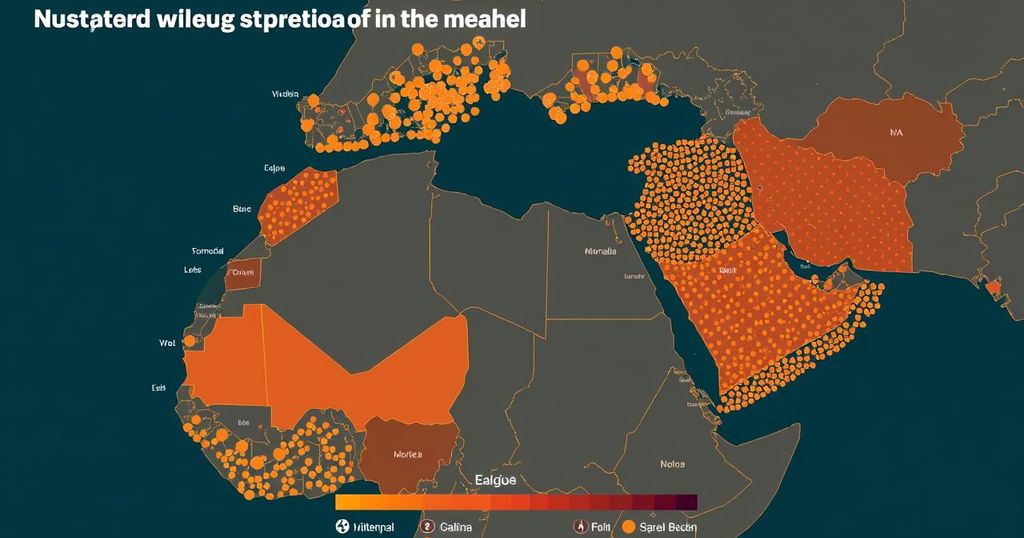Discontent is rising in the Sahel region as military juntas in Mali, Burkina Faso, and Niger face backlash due to unfulfilled promises and brutal tactics by Russian mercenaries. Investigative reports reveal escalating civilian and military casualties, leading to growing sentiments against both the juntas and their Russian allies. Additionally, crackdowns on opposition and media freedom signal a worrying trend for human rights in these countries. An alliance among the juntas looks to counter regional sanctions, yet it has not translated into visible prosperity for the populace.
Rising discontent with military juntas in the Sahel region reflects a growing frustration among the civilian populations of Mali, Burkina Faso, and Niger. Since the military coups which occurred between 2021 and 2023, these juntas have denounced previous civilian administrations for their alleged collusion with France, the former colonial power. Initially, public support lent itself to the military regimes, with citizens demonstrating their sentiments by burning French flags and waving Russian ones. However, a deepening dissatisfaction has emerged due to the juntas’ failure to fulfill their pledges and the brutal measures implemented by Russian mercenaries against civilians. Evelyn Groenink, coordinator of ZAM, remarked on the changing sentiments, noting, “The first slogans, ‘Russia out,’ have appeared on the walls of the Russian office in Niger. It’s a sign that a debate is taking place.” An extensive investigation entitled “Hotel Kremlin” was conducted by three African journalists: Malick Sadibou Coulibaly, Ramdane Gidigoro, and Rachid Zaid Combary. This examination illustrated the dire state of life under military rule in the Sahel. In Mali, Coulibaly provided a stark description of consistent power outages, stating, “It is 7 p.m. Everything is dark here. The lights are out due to almost continuous power cuts. Energie du Mali (EDM) has not provided power for 24 hours.” Citizens in these regions had hoped for improvement after their former governments were ousted, yet they now face escalating violence. The promised relief from terrorism by the Wagner Group, rebranded as Africa Corps, has not materialized; civilian and military casualties have reportedly surged. Coulibaly’s observation of a morgue overflowing with bodies in Bamako—a figure exceeding 200 between March and May—underscores the human toll of these conflicts. In light of regional sanctions imposed following the coups, the juntas established a confederation treaty known as the Alliance of Sahel States, facilitating mutual defense and trade. This pact signals a shift in allegiance from the Economic Community of West African States (ECOWAS) towards greater reliance on Russian support. However, economic benefits remain elusive for the populace, with visible prosperity seen only among junta leaders, demonstrating stark inequality. Coulibaly noted, “Here, new houses for the colonels have recently sprung up like mushrooms, and construction is still ongoing.” Repression has intensified in response to dissent, with governments employing severe measures against opposition voices. Reports indicate that the Burkina Faso administration has resorted to abductions to silence critics. In Mali, a crackdown on media and political activities has stifled public discourse, while Niger exhibits similar patterns of control. Human rights organizations and the international community express significant alarm over these trends. The residual resentment against France plays a crucial role in this dynamic. Many in the Sahel view France’s support as inadequate in combating terror threats, a sentiment that Russia has exploited to further its influence through disinformation campaigns. Despite assurances of improved security from the Wagner Group, evidence suggests that their presence has been accompanied by increased violence and civilian suffering, with Coulibaly stating, “In northern Mali, they terrorize, rape, and commit numerous atrocities.”
The political landscape of the Sahel region has been marked by a series of military coups that destabilized established governments in Mali, Burkina Faso, and Niger between 2021 and 2023. The juntas, having seized power, came to prominence by criticizing civilian leaders for their perceived complicity with France. The situation led to a public initial surge of support for the juntas, bolstered by anti-French sentiments and the embrace of Russian influence. However, an increase in violent reprisals against civilians and the inability of the juntas to deliver on their promises has now led to waning support. Human rights organizations are closely monitoring the resultant crackdowns on dissent and media freedom across these nations, amid rising civilian casualties and ongoing dissatisfaction. The region’s military regimes are now pursuing closer alliances with Russia, attempting to solidify their positions while distancing themselves from former colonial ties, yet this has not led to the anticipated economic benefits.
In conclusion, the Sahel region is witnessing a notable shift in public sentiment toward the military juntas that have seized power in Mali, Burkina Faso, and Niger. Initially supported amidst anti-colonial fervor, these regimes now face growing ire due to their unfulfilled promises and associated civilian hardships. Reports of violence perpetrated by Russian mercenaries, combined with governmental crackdowns on dissent, have contributed to a climate of fear and frustration amongst the populations. The newly formed Alliance of Sahel States offers a strategic departure from traditional alliances but has yet to yield any tangible improvement in living conditions or security for the people. As public patience wanes, a complex interplay of nationalistic fervor, human rights abuses, and geopolitical interests continues to shape the future of the Sahel.
Original Source: www.dw.com







